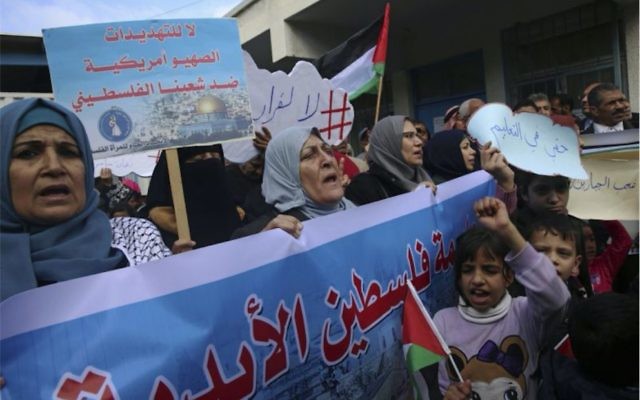US vs UNRWA: When is a refugee not a refugee?
The recent US government decision to reduce its contribution to UNRWA, the UN Relief and Works Agency responsible for "Palestinians refugees" has been presented as spiteful and a threat to the peace process. But is it?

THE recent US government decision to reduce its contribution to UNRWA, the UN Relief and Works Agency responsible for “Palestinians refugees” has been presented as spiteful and a threat to the peace process. But is it?
To understand the issue one has to start with the question: What is a refugee?
To qualify as a refugee, according to the United Nations Refugee Agency UNHCR, a person has to leave one’s home country and not be able to return, either because he or she is prevented from doing so, or because of fear of the consequences.
This applies specifically to an individual and his or her minor children. Refugee status is not a right that is inherited by future generations otherwise a large proportion of the world’s population would be refugees, having at least one ancestor who at one stage in the past had to flee a country.
A further criterion is, once refugees are firmly settled, they become citizens and are no longer refugees. This is the case of hundreds of millions of refugees since the Second World War who have settled in countries other than their native homes. They became citizens of the adoptive country.
Which leads us to the question: How many Palestinian refugees are there? Figures of five and ten million are often cited in the media.
However based on the definition, only those who personally left what is now Israel and their immediate children, generally thought to number about 750,000, were eligible for consideration as refugees then. Thus, the overwhelming majority of today’s claimants do not qualify, leaving only the survivors of that era.
Next, according to the definition, once one is firmly settled one is no longer a refugee. In 1948, Palestinians fled Israel to neighbouring states, principally Lebanon, Syria and Jordan.
Cynically, goaded by all the Arab states, Lebanon and Syria deprived the original Palestinian refugees of civil rights. Since then generations have been born, forced to live in restricted areas in order to maintain the false notion that they live in refugee camps and are not fully settled.
The international community ignores this shameful deprivation of dignity and rights. However, since generations of Palestinians have been born in these countries there is no question: they are firmly settled and hence no longer meet the definition of refugees.
Which leads us to the last category: those who live in what is to become Palestine: Gaza and the West Bank. Here the Palestinians have been living for a generation under their own government, a government which they elected in a free ballot. To call someone a refugee in one’s own country is the ultimate contradiction.
So when is a refugee not a refugee? When that person is a “Palestinian refugee”. The term “Palestinian refugee” should be taken out of our lexicon unless it refers to events in the mid-twentieth century.
Why is this important? Because, when national and international aid agencies provide financial support to ‘refugees’ as opposed to welfare recipients, they are implicitly promoting the Palestinian claim of “a right of return” to their original home, that is, in Israel.
International aid finances the teaching in UNRWA schools that children should grow up to fight the Jews so they may return to their ancestral homes. The agencies are therefore complicit in the failure of the peace process.
Why has the international community taken an indulgent attitude to the Palestinians? The reasons are complex and multiple.
First, was the need for oil. The world was held to ransom in 1973 and succumbed to Arab pressure. Second is post colonial guilt. Third, the number of Arab and Muslim states participating in international fora relative to the one solitary Jewish state. Fourth, not insignificant, is anti-Semitism in some cases.
There is no reason for the Gaza population being among the poorest. They live in the same geographical part of the world as Israel, but while Israel has created an economically thriving, modern, democratic society, Gaza is an overpopulated terrorist state descending deeper into poverty.
Were it not for terrorism and Islamist ideology, Gazan beaches could attract tourism. If the Mediterranean was not a route for advanced weapons smuggling, Gaza could have a thriving fishing industry. If tunnels weren’t built to kill Israelis the importation of construction materials would not be restricted. Instead Hamas has chosen terrorism and has been rewarded with foreign aid.
While the topography of the West Bank is different, it too could, with family planning, viable social institutions and education for employment, raise itself out of poverty. Instead, its government ignores the debilitating consequence of unrestricted population growth, promotes terrorists as role models, focuses on victimhood, denies widespread corruption, discourages joint enterprises with Israelis, all factors ignored by international agencies.
There is a considerable increase in the number of high tech enterprises being developed by Israeli Arabs either alone or in partnership with Jews. If the Palestinians did not pursue a hostile policy towards Israel its engineers, technicians, scientists, skilled and unskilled workers could be employed in Israel’s thriving industries. Palestinian entrepreneurs could collaborate with Israeli Jews and Arabs developing new enterprises.
Instead of turning a blind eye to the dysfunctional and destructive policies of the Palestinian governments, the international community could use aid as a lever to goad the Palestinians into creating a viable society.
The US move is the first step to break the cycle. As in the case of the Greek economy, aid to the Palestinians should be conditioned on meeting certain targets, mainly social and economic measures on the road to self-sufficiency.
ROBERT MAGID is owner and publisher of The AJN.

comments